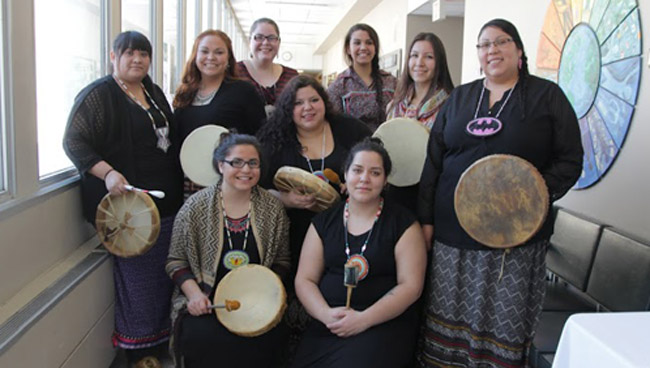Conference tackles affects of residential schools and stereotypes

By Shirley Honyust
LONDON – Susan Aglukark kicked off the “It Matters to Us” conference held at Althouse College on the campus of Western University.
She delivered some her songs following the theme: How do we re-awaken the dreamer? In her words, “true transformation takes place when we forgive enough to heal. Imagine what our children can do if they don’t have to carry our burdens!” Her performance was both inspiring and entertaining.
Wab Kinew, from Onigaming First Nation shared with participants the importance of traditions and culture in society today. His work has changed from journalist to broadcaster after the Winnipeg Free Press published a letter to the editor which he had written about Team Canada. He has worked for the local CBC Radio, created a weekly arts magazine show –The 204 – and has hosted a national documentary series – The 8th Fire for CBC in 2012. In 2014 he was a panelist on CBC Radio, defending the novel by Joseph Boyden entitled The Orenda (which went on to win Canada Reads 2014).
Kinew referenced the impact that residential school experiences had on his family and the toll it took on their background. His presentation included a motivational speech on personal respect and responsibility that held the audience captivated. Conference-goers thoroughly enjoyed this young professional speaker, his delivery sprinkled with his own brand of humour which was as much at his own expense as others.
He left a powerful impact with the audience, leaving his listeners with the still unanswered question, “What will you tell your children and your grandchildren that you did to change things for the better? I’m going to tell mine ‘I did what I could’.”
Kinew was swiftly hijacked by the Sisters of All Nations traditional drum group who did their own presentation for him, a very saucy version of Backstreets No Diggity which is also on You Tube.
Susie Kicknosway-Jones from Walpole Island told her story for many who had heard it for the first time. She was four and a half years old when she was picked up by plane and delivered to Shingwauk Indian Residential School –today it is remodeled as Shingwauk Hall. At the age of four she didn’t have many memories of her family. Children at school asked her if she missed her mom, to which she replied “you can’t miss what you never had.” A lot of parents died when their kids were at residential school and still they could not go home.
Her presentation included many slides involving students, nuns, and bishops who also principled the school. One slide included an Indian Residential Schools map and legend, indicating 132 of the 135 schools listed in Canada.
Painfully she shared that one third of her family was killed off in residential school as one brother, Leo, took ill with a pain in his stomach, and another brother, Leonard, was made to sit by his bed for three days before he died.
After returning from Shingwauk Susie finished Grade 12 and went to work in Detroit for Children Services. People would ask her “what kind of Indian are you?” to which she would answer “Cherokee” since that was the identification that she heard quite often, and it revealed nothing of her origins. Today she does genealogy on her own First Nation – Walpole Island – where her services are much in demand.
Nancy Deleary, a local Indigenous artist from Chippewas of the Thames First Nation, taught participants the impact of Indigenous art at the personal and public level. She shared with the audience her research into the End of the Trail picture – of horse and rider exhausted and near their demise, which many have rejected as an overt stereotypical image. Nancy studied and spent time in the U.S. where she was influenced by meeting with such amazing celebrity figures as Floyd Red Crow and John Trudell. She was also inspired by Winnona LaDuke, an Ojibwe Native American Activist, environmentalist, economist and writer, well known for her work on tribal land claims and preservation.
Nancy is now active in community development in her home community, where she has shared the portfolios of Finance, Lands and Environment, Culture, Language and Heritage, as well as the War of 1812. She is currently pursuing her Masters in Fine Arts through the University of Vermont.
The “It Matters to Us” conference was put together by the Truth and Reconciliation Chapter in London through generous donations from a multitude of sources, including: Thames Valley District School Board; Sisters of St Joseph; London District Catholic School Board; Western Education Indigenous Education; the United Church of Canada; Ursulines of the Chatham Union; Social Sciences and Humanities Research Council of Canada and the Western Education Centre for Research and Education on Violence Against Women and Children.


